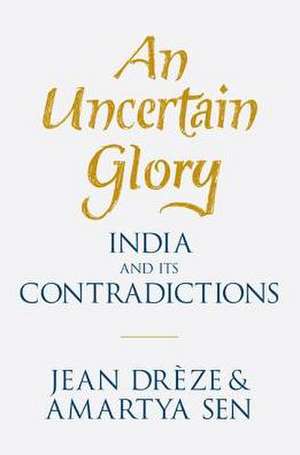An Uncertain Glory: India and Its Contradictions
Autor Jean Dreze, Amartya Senen Limba Engleză Paperback – 21 mar 2015
When India became independent in 1947 after two centuries of colonial rule, it immediately adopted a firmly democratic political system, with multiple parties, freedom of speech, and extensive political rights. The famines of the British era disappeared, and steady economic growth replaced the economic stagnation of the Raj. The growth of the Indian economy quickened further over the last three decades and became the second fastest among large economies. Despite a recent dip, it is still one of the highest in the world.
Maintaining rapid as well as environmentally sustainable growth remains an important and achievable goal for India. In "An Uncertain Glory," two of India's leading economists argue that the country's main problems lie in the lack of attention paid to the essential needs of the people, especially of the poor, and often of women. There have been major failures both to foster participatory growth and to make good use of the public resources generated by economic growth to enhance people's living conditions. There is also a continued inadequacy of social services such as schooling and medical care as well as of physical services such as safe water, electricity, drainage, transportation, and sanitation. In the long run, even the feasibility of high economic growth is threatened by the underdevelopment of social and physical infrastructure and the neglect of human capabilities, in contrast with the Asian approach of simultaneous pursuit of economic growth and human development, as pioneered by Japan, South Korea, and China.
In a democratic system, which India has great reason to value, addressing these failures requires not only significant policy rethinking by the government, but also a clearer public understanding of the abysmal extent of social and economic deprivations in the country. The deep inequalities in Indian society tend to constrict public discussion, confining it largely to the lives and concerns of the relatively affluent. Dreze and Sen present a powerful analysis of these deprivations and inequalities as well as the possibility of change through democratic practice."
Preț: 140.85 lei
Preț vechi: 140.85 lei
-NaN% Nou
26.96€ • 29.29$ • 22.66£
Carte disponibilă
Livrare economică 31 martie-14 aprilie
Specificații
ISBN-10: 0691165521
Pagini: 448
Dimensiuni: 147 x 226 x 25 mm
Greutate: 0.54 kg
Editura: Princeton University Press
Textul de pe ultima copertă
"India is a great success story of economic growth and poverty decline, but it remains the home of global poverty, and half of its children are profoundly malnourished. This paradox of poverty and plenty poses one of the great intellectual and moral challenges of the day. We can ask for no better guides to it than a philosopher and an activist, both distinguished economists, and both with unparalleled knowledge of India's glories and its shames."--Angus Deaton, author of The Great Escape: Health, Wealth, and the Origins of Inequality
"This important book provides a comprehensive and probing analysis of the Indian economy and its enormous potential. What makes this such an engaging book is that it is a deeply sympathetic and, for that very reason, a deeply critical evaluation of contemporary India. The book's combination of economics, politics, history, and law makes it a fascinating read."--Kaushik Basu, chief economist of the World Bank
